Families and Mental Health in Acute Care: Developing an Education Tool
VerifiedAdded on 2022/09/26
|8
|1799
|23
Report
AI Summary
This report focuses on the critical role of families in the context of mental health within acute care settings. It emphasizes the importance of family nursing and the need for nurses to possess knowledge of family systems, structures, and processes. The assignment aims to develop an education tool for nurses, highlighting strategies like psychoeducation and matrix-based approaches to enhance their understanding and ability to support families. The report discusses the impact of mental illness on families, the effectiveness of interventions like awareness and health promotion programs, and the significance of family nursing theory, including the Calgary Family Association Model (CFAM) and the Calgary Family Intervention Model (CFIM). The report references several studies that demonstrate the positive impact of educational interventions on nurses' perceptions and skills, as well as the benefits of family involvement in patient care. The report also includes a family resource, a website that offers information about mental health and support for families. The report's overall aim is to improve the quality of care for patients and their families in acute care settings by providing nurses with the necessary tools and knowledge.
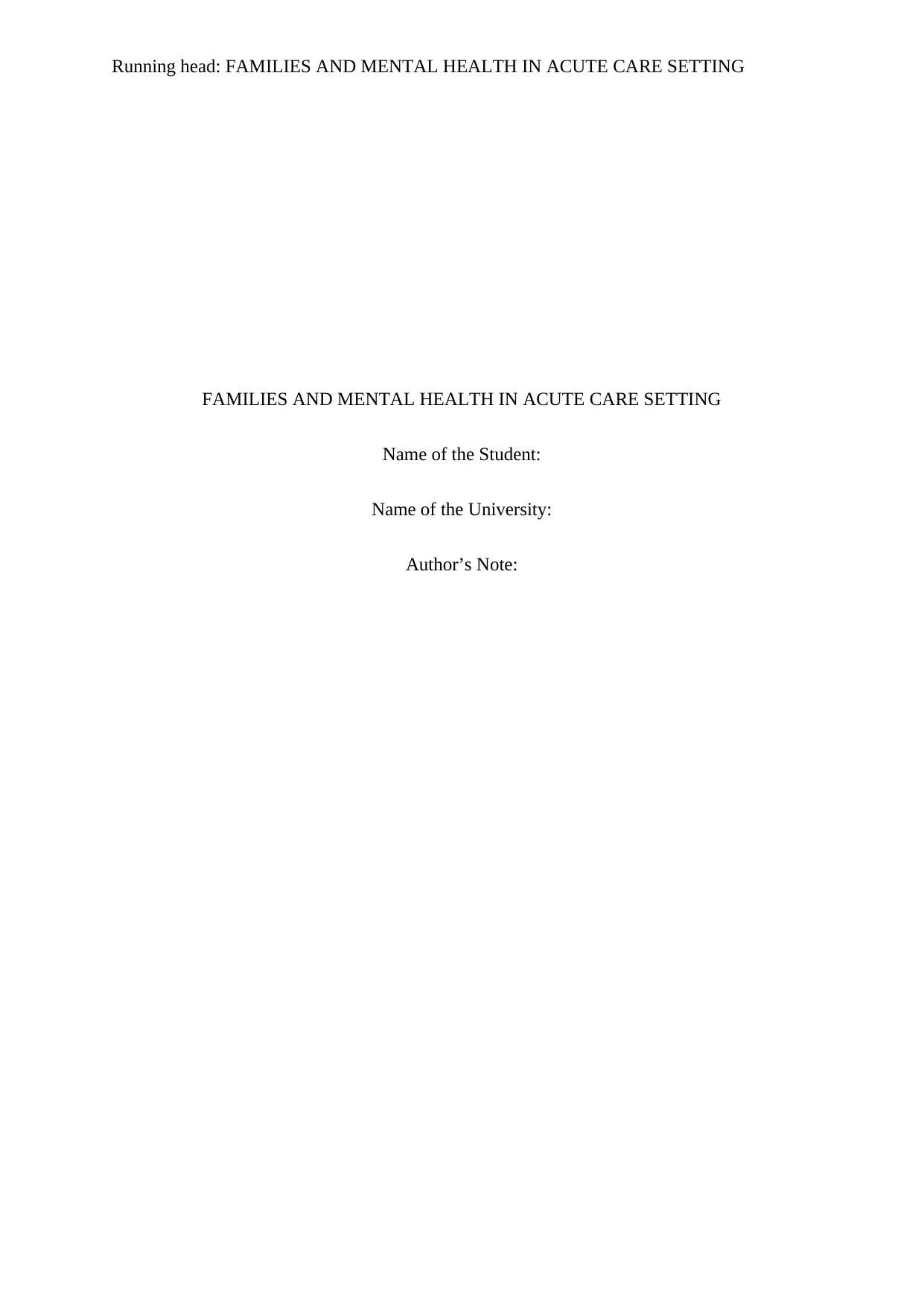
Running head: FAMILIES AND MENTAL HEALTH IN ACUTE CARE SETTING
FAMILIES AND MENTAL HEALTH IN ACUTE CARE SETTING
Name of the Student:
Name of the University:
Author’s Note:
FAMILIES AND MENTAL HEALTH IN ACUTE CARE SETTING
Name of the Student:
Name of the University:
Author’s Note:
Paraphrase This Document
Need a fresh take? Get an instant paraphrase of this document with our AI Paraphraser
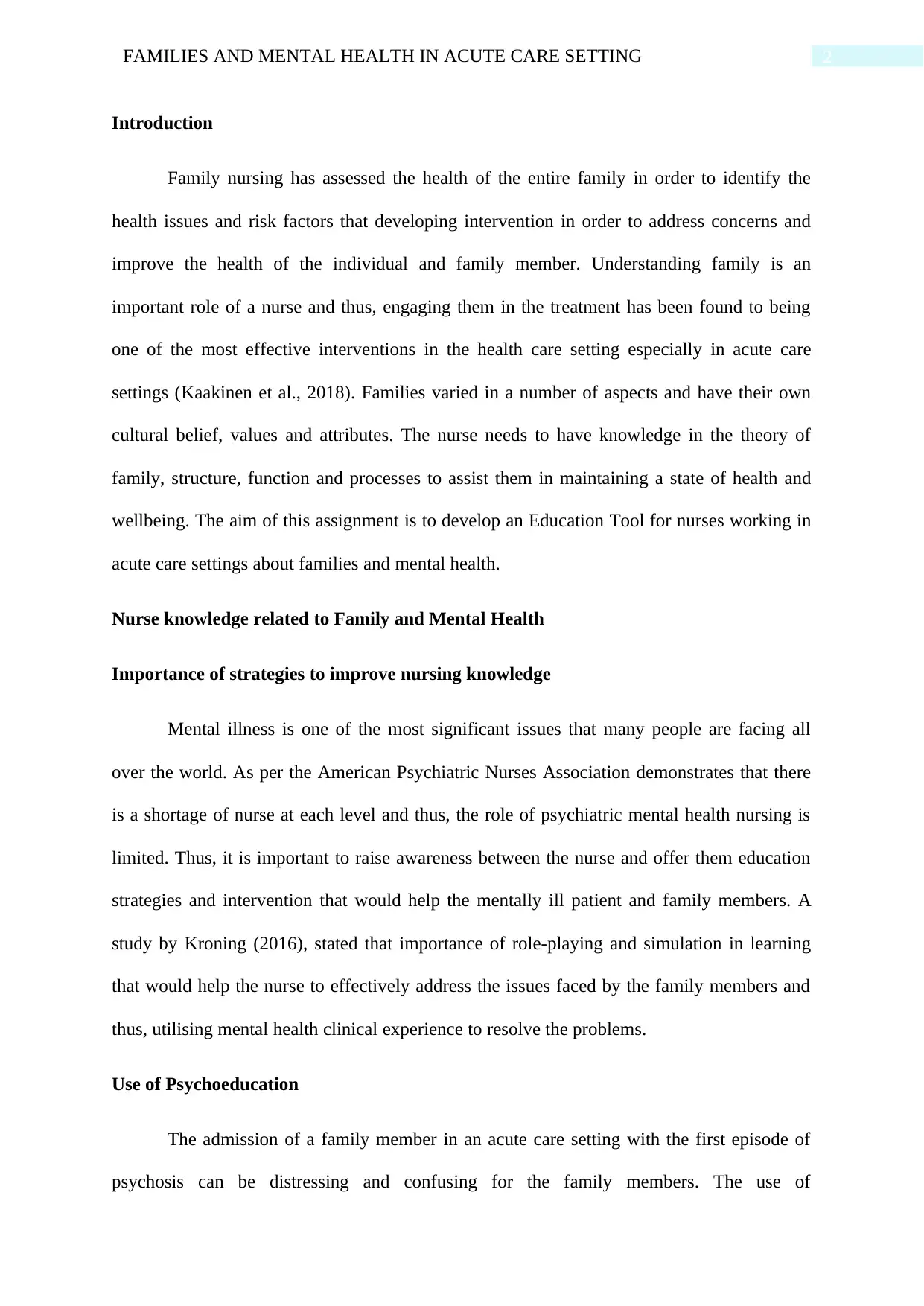
2FAMILIES AND MENTAL HEALTH IN ACUTE CARE SETTING
Introduction
Family nursing has assessed the health of the entire family in order to identify the
health issues and risk factors that developing intervention in order to address concerns and
improve the health of the individual and family member. Understanding family is an
important role of a nurse and thus, engaging them in the treatment has been found to being
one of the most effective interventions in the health care setting especially in acute care
settings (Kaakinen et al., 2018). Families varied in a number of aspects and have their own
cultural belief, values and attributes. The nurse needs to have knowledge in the theory of
family, structure, function and processes to assist them in maintaining a state of health and
wellbeing. The aim of this assignment is to develop an Education Tool for nurses working in
acute care settings about families and mental health.
Nurse knowledge related to Family and Mental Health
Importance of strategies to improve nursing knowledge
Mental illness is one of the most significant issues that many people are facing all
over the world. As per the American Psychiatric Nurses Association demonstrates that there
is a shortage of nurse at each level and thus, the role of psychiatric mental health nursing is
limited. Thus, it is important to raise awareness between the nurse and offer them education
strategies and intervention that would help the mentally ill patient and family members. A
study by Kroning (2016), stated that importance of role-playing and simulation in learning
that would help the nurse to effectively address the issues faced by the family members and
thus, utilising mental health clinical experience to resolve the problems.
Use of Psychoeducation
The admission of a family member in an acute care setting with the first episode of
psychosis can be distressing and confusing for the family members. The use of
Introduction
Family nursing has assessed the health of the entire family in order to identify the
health issues and risk factors that developing intervention in order to address concerns and
improve the health of the individual and family member. Understanding family is an
important role of a nurse and thus, engaging them in the treatment has been found to being
one of the most effective interventions in the health care setting especially in acute care
settings (Kaakinen et al., 2018). Families varied in a number of aspects and have their own
cultural belief, values and attributes. The nurse needs to have knowledge in the theory of
family, structure, function and processes to assist them in maintaining a state of health and
wellbeing. The aim of this assignment is to develop an Education Tool for nurses working in
acute care settings about families and mental health.
Nurse knowledge related to Family and Mental Health
Importance of strategies to improve nursing knowledge
Mental illness is one of the most significant issues that many people are facing all
over the world. As per the American Psychiatric Nurses Association demonstrates that there
is a shortage of nurse at each level and thus, the role of psychiatric mental health nursing is
limited. Thus, it is important to raise awareness between the nurse and offer them education
strategies and intervention that would help the mentally ill patient and family members. A
study by Kroning (2016), stated that importance of role-playing and simulation in learning
that would help the nurse to effectively address the issues faced by the family members and
thus, utilising mental health clinical experience to resolve the problems.
Use of Psychoeducation
The admission of a family member in an acute care setting with the first episode of
psychosis can be distressing and confusing for the family members. The use of
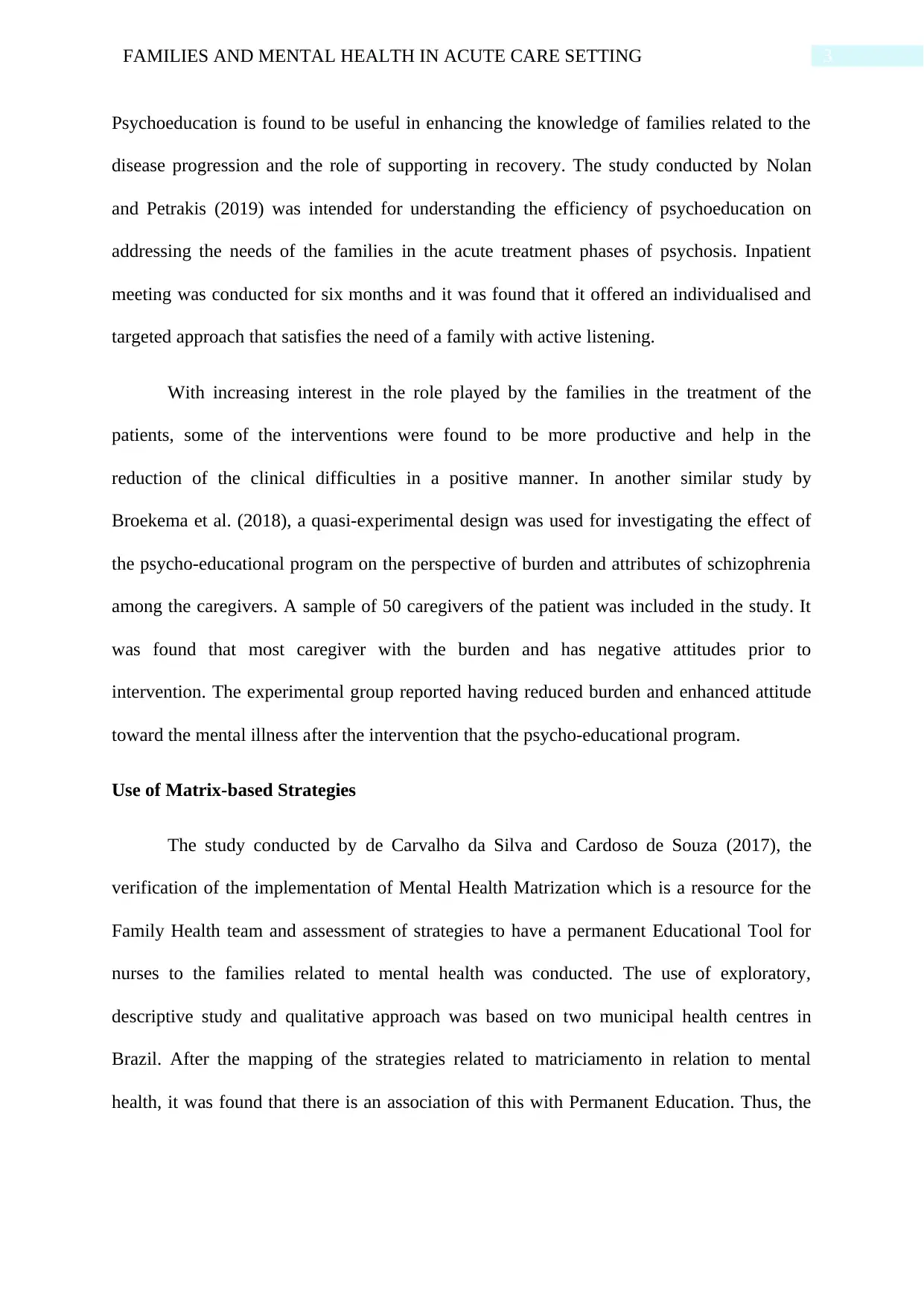
3FAMILIES AND MENTAL HEALTH IN ACUTE CARE SETTING
Psychoeducation is found to be useful in enhancing the knowledge of families related to the
disease progression and the role of supporting in recovery. The study conducted by Nolan
and Petrakis (2019) was intended for understanding the efficiency of psychoeducation on
addressing the needs of the families in the acute treatment phases of psychosis. Inpatient
meeting was conducted for six months and it was found that it offered an individualised and
targeted approach that satisfies the need of a family with active listening.
With increasing interest in the role played by the families in the treatment of the
patients, some of the interventions were found to be more productive and help in the
reduction of the clinical difficulties in a positive manner. In another similar study by
Broekema et al. (2018), a quasi-experimental design was used for investigating the effect of
the psycho-educational program on the perspective of burden and attributes of schizophrenia
among the caregivers. A sample of 50 caregivers of the patient was included in the study. It
was found that most caregiver with the burden and has negative attitudes prior to
intervention. The experimental group reported having reduced burden and enhanced attitude
toward the mental illness after the intervention that the psycho-educational program.
Use of Matrix-based Strategies
The study conducted by de Carvalho da Silva and Cardoso de Souza (2017), the
verification of the implementation of Mental Health Matrization which is a resource for the
Family Health team and assessment of strategies to have a permanent Educational Tool for
nurses to the families related to mental health was conducted. The use of exploratory,
descriptive study and qualitative approach was based on two municipal health centres in
Brazil. After the mapping of the strategies related to matriciamento in relation to mental
health, it was found that there is an association of this with Permanent Education. Thus, the
Psychoeducation is found to be useful in enhancing the knowledge of families related to the
disease progression and the role of supporting in recovery. The study conducted by Nolan
and Petrakis (2019) was intended for understanding the efficiency of psychoeducation on
addressing the needs of the families in the acute treatment phases of psychosis. Inpatient
meeting was conducted for six months and it was found that it offered an individualised and
targeted approach that satisfies the need of a family with active listening.
With increasing interest in the role played by the families in the treatment of the
patients, some of the interventions were found to be more productive and help in the
reduction of the clinical difficulties in a positive manner. In another similar study by
Broekema et al. (2018), a quasi-experimental design was used for investigating the effect of
the psycho-educational program on the perspective of burden and attributes of schizophrenia
among the caregivers. A sample of 50 caregivers of the patient was included in the study. It
was found that most caregiver with the burden and has negative attitudes prior to
intervention. The experimental group reported having reduced burden and enhanced attitude
toward the mental illness after the intervention that the psycho-educational program.
Use of Matrix-based Strategies
The study conducted by de Carvalho da Silva and Cardoso de Souza (2017), the
verification of the implementation of Mental Health Matrization which is a resource for the
Family Health team and assessment of strategies to have a permanent Educational Tool for
nurses to the families related to mental health was conducted. The use of exploratory,
descriptive study and qualitative approach was based on two municipal health centres in
Brazil. After the mapping of the strategies related to matriciamento in relation to mental
health, it was found that there is an association of this with Permanent Education. Thus, the
⊘ This is a preview!⊘
Do you want full access?
Subscribe today to unlock all pages.

Trusted by 1+ million students worldwide
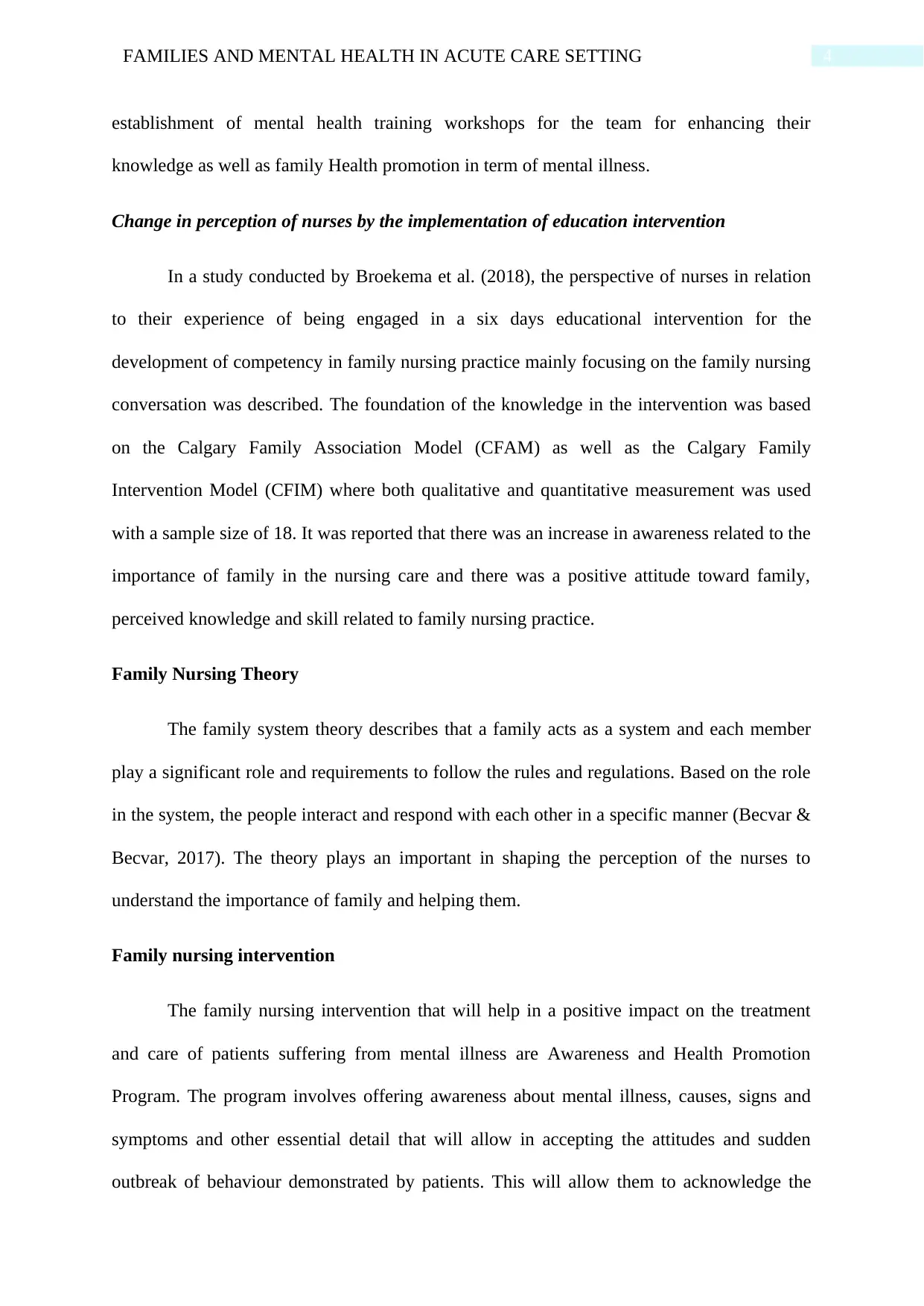
4FAMILIES AND MENTAL HEALTH IN ACUTE CARE SETTING
establishment of mental health training workshops for the team for enhancing their
knowledge as well as family Health promotion in term of mental illness.
Change in perception of nurses by the implementation of education intervention
In a study conducted by Broekema et al. (2018), the perspective of nurses in relation
to their experience of being engaged in a six days educational intervention for the
development of competency in family nursing practice mainly focusing on the family nursing
conversation was described. The foundation of the knowledge in the intervention was based
on the Calgary Family Association Model (CFAM) as well as the Calgary Family
Intervention Model (CFIM) where both qualitative and quantitative measurement was used
with a sample size of 18. It was reported that there was an increase in awareness related to the
importance of family in the nursing care and there was a positive attitude toward family,
perceived knowledge and skill related to family nursing practice.
Family Nursing Theory
The family system theory describes that a family acts as a system and each member
play a significant role and requirements to follow the rules and regulations. Based on the role
in the system, the people interact and respond with each other in a specific manner (Becvar &
Becvar, 2017). The theory plays an important in shaping the perception of the nurses to
understand the importance of family and helping them.
Family nursing intervention
The family nursing intervention that will help in a positive impact on the treatment
and care of patients suffering from mental illness are Awareness and Health Promotion
Program. The program involves offering awareness about mental illness, causes, signs and
symptoms and other essential detail that will allow in accepting the attitudes and sudden
outbreak of behaviour demonstrated by patients. This will allow them to acknowledge the
establishment of mental health training workshops for the team for enhancing their
knowledge as well as family Health promotion in term of mental illness.
Change in perception of nurses by the implementation of education intervention
In a study conducted by Broekema et al. (2018), the perspective of nurses in relation
to their experience of being engaged in a six days educational intervention for the
development of competency in family nursing practice mainly focusing on the family nursing
conversation was described. The foundation of the knowledge in the intervention was based
on the Calgary Family Association Model (CFAM) as well as the Calgary Family
Intervention Model (CFIM) where both qualitative and quantitative measurement was used
with a sample size of 18. It was reported that there was an increase in awareness related to the
importance of family in the nursing care and there was a positive attitude toward family,
perceived knowledge and skill related to family nursing practice.
Family Nursing Theory
The family system theory describes that a family acts as a system and each member
play a significant role and requirements to follow the rules and regulations. Based on the role
in the system, the people interact and respond with each other in a specific manner (Becvar &
Becvar, 2017). The theory plays an important in shaping the perception of the nurses to
understand the importance of family and helping them.
Family nursing intervention
The family nursing intervention that will help in a positive impact on the treatment
and care of patients suffering from mental illness are Awareness and Health Promotion
Program. The program involves offering awareness about mental illness, causes, signs and
symptoms and other essential detail that will allow in accepting the attitudes and sudden
outbreak of behaviour demonstrated by patients. This will allow them to acknowledge the
Paraphrase This Document
Need a fresh take? Get an instant paraphrase of this document with our AI Paraphraser
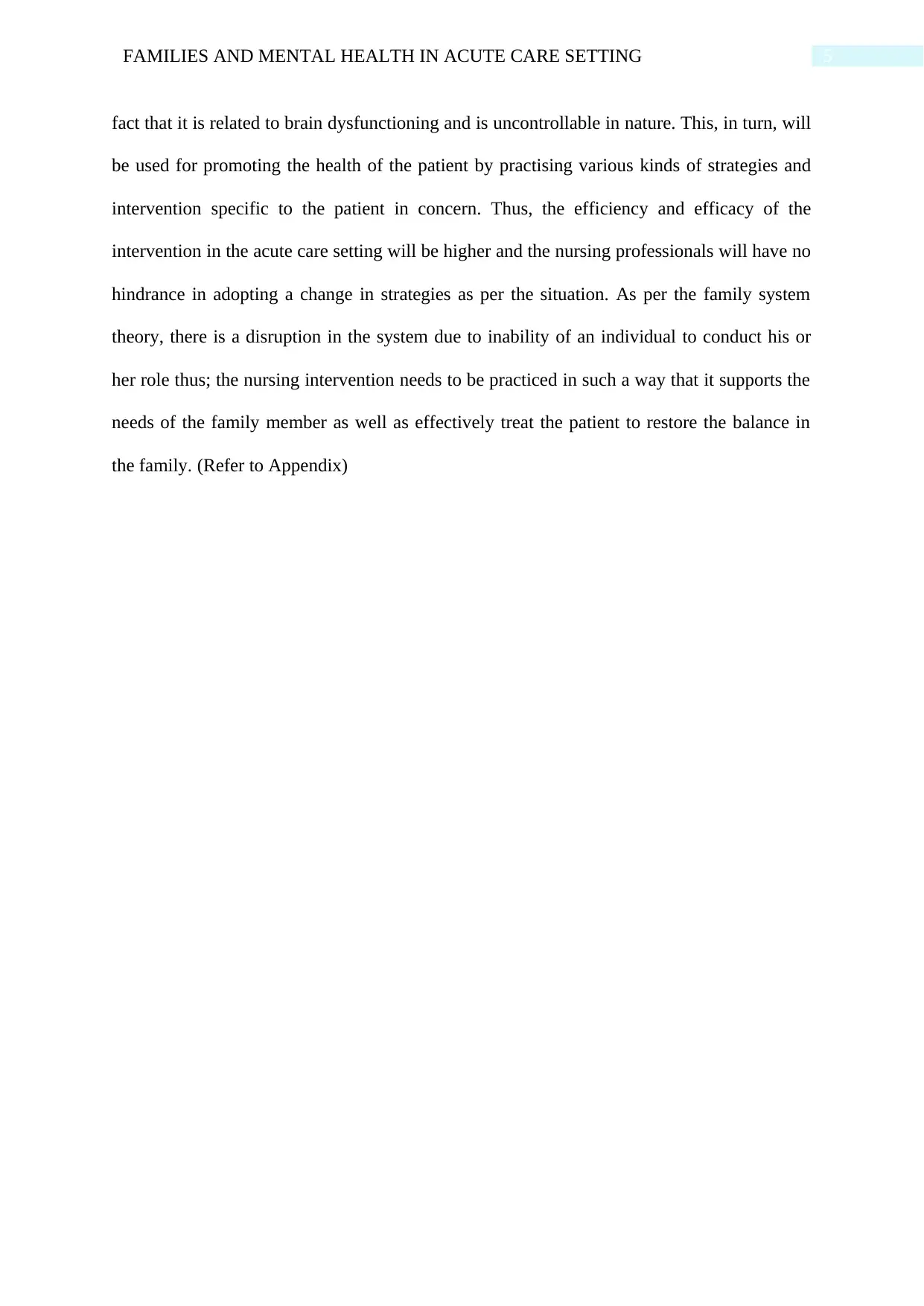
5FAMILIES AND MENTAL HEALTH IN ACUTE CARE SETTING
fact that it is related to brain dysfunctioning and is uncontrollable in nature. This, in turn, will
be used for promoting the health of the patient by practising various kinds of strategies and
intervention specific to the patient in concern. Thus, the efficiency and efficacy of the
intervention in the acute care setting will be higher and the nursing professionals will have no
hindrance in adopting a change in strategies as per the situation. As per the family system
theory, there is a disruption in the system due to inability of an individual to conduct his or
her role thus; the nursing intervention needs to be practiced in such a way that it supports the
needs of the family member as well as effectively treat the patient to restore the balance in
the family. (Refer to Appendix)
fact that it is related to brain dysfunctioning and is uncontrollable in nature. This, in turn, will
be used for promoting the health of the patient by practising various kinds of strategies and
intervention specific to the patient in concern. Thus, the efficiency and efficacy of the
intervention in the acute care setting will be higher and the nursing professionals will have no
hindrance in adopting a change in strategies as per the situation. As per the family system
theory, there is a disruption in the system due to inability of an individual to conduct his or
her role thus; the nursing intervention needs to be practiced in such a way that it supports the
needs of the family member as well as effectively treat the patient to restore the balance in
the family. (Refer to Appendix)
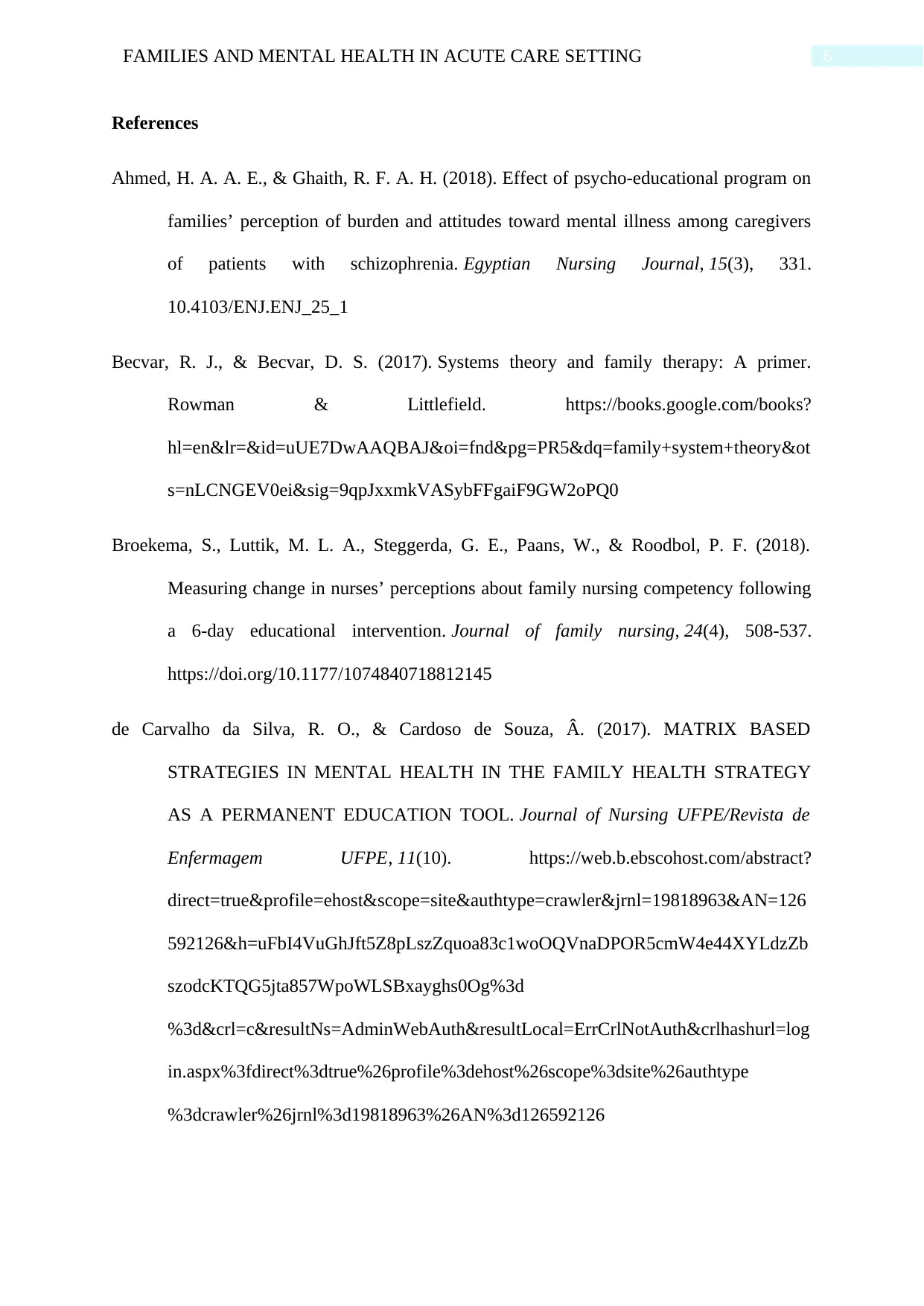
6FAMILIES AND MENTAL HEALTH IN ACUTE CARE SETTING
References
Ahmed, H. A. A. E., & Ghaith, R. F. A. H. (2018). Effect of psycho-educational program on
families’ perception of burden and attitudes toward mental illness among caregivers
of patients with schizophrenia. Egyptian Nursing Journal, 15(3), 331.
10.4103/ENJ.ENJ_25_1
Becvar, R. J., & Becvar, D. S. (2017). Systems theory and family therapy: A primer.
Rowman & Littlefield. https://books.google.com/books?
hl=en&lr=&id=uUE7DwAAQBAJ&oi=fnd&pg=PR5&dq=family+system+theory&ot
s=nLCNGEV0ei&sig=9qpJxxmkVASybFFgaiF9GW2oPQ0
Broekema, S., Luttik, M. L. A., Steggerda, G. E., Paans, W., & Roodbol, P. F. (2018).
Measuring change in nurses’ perceptions about family nursing competency following
a 6-day educational intervention. Journal of family nursing, 24(4), 508-537.
https://doi.org/10.1177/1074840718812145
de Carvalho da Silva, R. O., & Cardoso de Souza, Â. (2017). MATRIX BASED
STRATEGIES IN MENTAL HEALTH IN THE FAMILY HEALTH STRATEGY
AS A PERMANENT EDUCATION TOOL. Journal of Nursing UFPE/Revista de
Enfermagem UFPE, 11(10). https://web.b.ebscohost.com/abstract?
direct=true&profile=ehost&scope=site&authtype=crawler&jrnl=19818963&AN=126
592126&h=uFbI4VuGhJft5Z8pLszZquoa83c1woOQVnaDPOR5cmW4e44XYLdzZb
szodcKTQG5jta857WpoWLSBxayghs0Og%3d
%3d&crl=c&resultNs=AdminWebAuth&resultLocal=ErrCrlNotAuth&crlhashurl=log
in.aspx%3fdirect%3dtrue%26profile%3dehost%26scope%3dsite%26authtype
%3dcrawler%26jrnl%3d19818963%26AN%3d126592126
References
Ahmed, H. A. A. E., & Ghaith, R. F. A. H. (2018). Effect of psycho-educational program on
families’ perception of burden and attitudes toward mental illness among caregivers
of patients with schizophrenia. Egyptian Nursing Journal, 15(3), 331.
10.4103/ENJ.ENJ_25_1
Becvar, R. J., & Becvar, D. S. (2017). Systems theory and family therapy: A primer.
Rowman & Littlefield. https://books.google.com/books?
hl=en&lr=&id=uUE7DwAAQBAJ&oi=fnd&pg=PR5&dq=family+system+theory&ot
s=nLCNGEV0ei&sig=9qpJxxmkVASybFFgaiF9GW2oPQ0
Broekema, S., Luttik, M. L. A., Steggerda, G. E., Paans, W., & Roodbol, P. F. (2018).
Measuring change in nurses’ perceptions about family nursing competency following
a 6-day educational intervention. Journal of family nursing, 24(4), 508-537.
https://doi.org/10.1177/1074840718812145
de Carvalho da Silva, R. O., & Cardoso de Souza, Â. (2017). MATRIX BASED
STRATEGIES IN MENTAL HEALTH IN THE FAMILY HEALTH STRATEGY
AS A PERMANENT EDUCATION TOOL. Journal of Nursing UFPE/Revista de
Enfermagem UFPE, 11(10). https://web.b.ebscohost.com/abstract?
direct=true&profile=ehost&scope=site&authtype=crawler&jrnl=19818963&AN=126
592126&h=uFbI4VuGhJft5Z8pLszZquoa83c1woOQVnaDPOR5cmW4e44XYLdzZb
szodcKTQG5jta857WpoWLSBxayghs0Og%3d
%3d&crl=c&resultNs=AdminWebAuth&resultLocal=ErrCrlNotAuth&crlhashurl=log
in.aspx%3fdirect%3dtrue%26profile%3dehost%26scope%3dsite%26authtype
%3dcrawler%26jrnl%3d19818963%26AN%3d126592126
⊘ This is a preview!⊘
Do you want full access?
Subscribe today to unlock all pages.

Trusted by 1+ million students worldwide
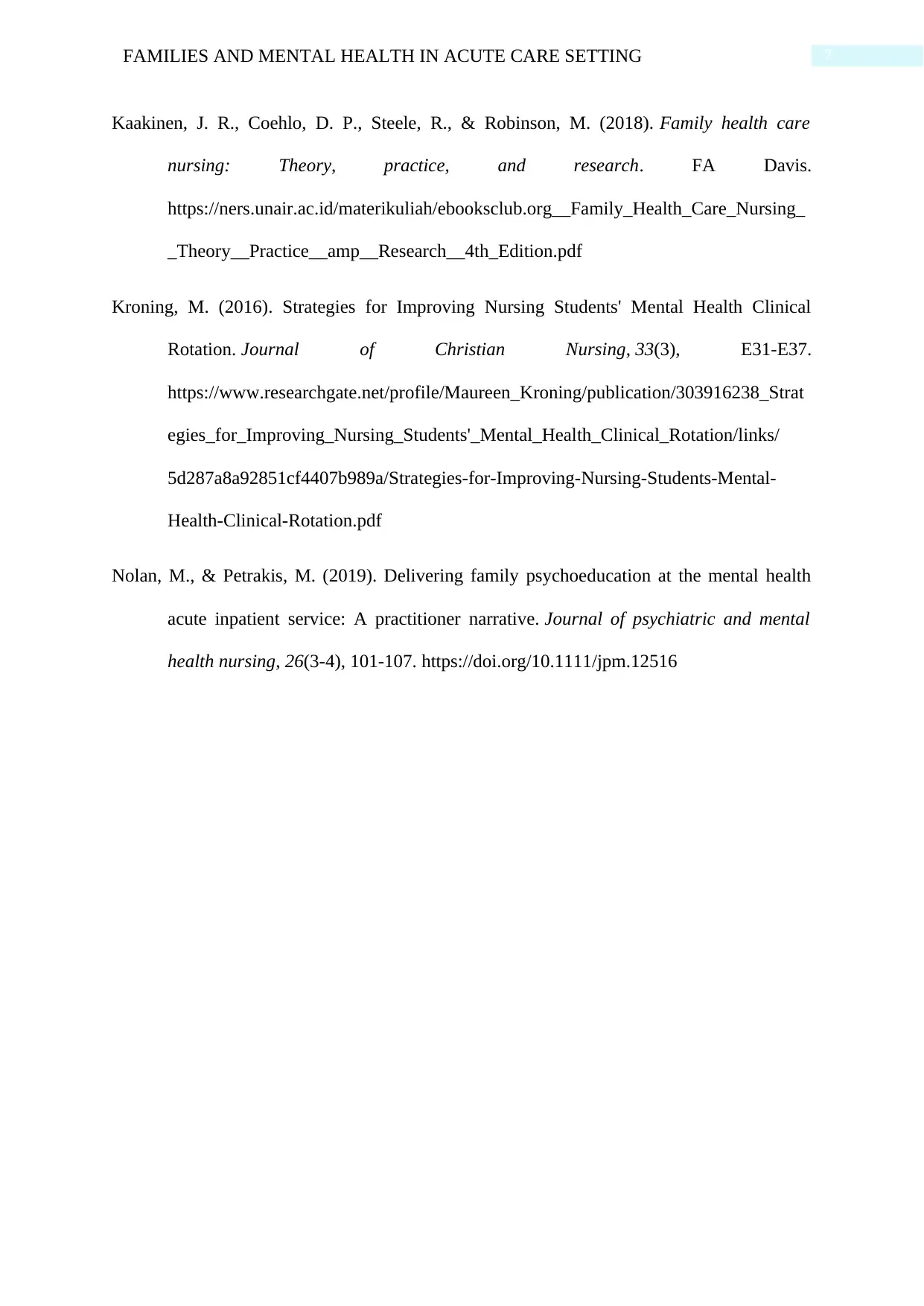
7FAMILIES AND MENTAL HEALTH IN ACUTE CARE SETTING
Kaakinen, J. R., Coehlo, D. P., Steele, R., & Robinson, M. (2018). Family health care
nursing: Theory, practice, and research. FA Davis.
https://ners.unair.ac.id/materikuliah/ebooksclub.org__Family_Health_Care_Nursing_
_Theory__Practice__amp__Research__4th_Edition.pdf
Kroning, M. (2016). Strategies for Improving Nursing Students' Mental Health Clinical
Rotation. Journal of Christian Nursing, 33(3), E31-E37.
https://www.researchgate.net/profile/Maureen_Kroning/publication/303916238_Strat
egies_for_Improving_Nursing_Students'_Mental_Health_Clinical_Rotation/links/
5d287a8a92851cf4407b989a/Strategies-for-Improving-Nursing-Students-Mental-
Health-Clinical-Rotation.pdf
Nolan, M., & Petrakis, M. (2019). Delivering family psychoeducation at the mental health
acute inpatient service: A practitioner narrative. Journal of psychiatric and mental
health nursing, 26(3-4), 101-107. https://doi.org/10.1111/jpm.12516
Kaakinen, J. R., Coehlo, D. P., Steele, R., & Robinson, M. (2018). Family health care
nursing: Theory, practice, and research. FA Davis.
https://ners.unair.ac.id/materikuliah/ebooksclub.org__Family_Health_Care_Nursing_
_Theory__Practice__amp__Research__4th_Edition.pdf
Kroning, M. (2016). Strategies for Improving Nursing Students' Mental Health Clinical
Rotation. Journal of Christian Nursing, 33(3), E31-E37.
https://www.researchgate.net/profile/Maureen_Kroning/publication/303916238_Strat
egies_for_Improving_Nursing_Students'_Mental_Health_Clinical_Rotation/links/
5d287a8a92851cf4407b989a/Strategies-for-Improving-Nursing-Students-Mental-
Health-Clinical-Rotation.pdf
Nolan, M., & Petrakis, M. (2019). Delivering family psychoeducation at the mental health
acute inpatient service: A practitioner narrative. Journal of psychiatric and mental
health nursing, 26(3-4), 101-107. https://doi.org/10.1111/jpm.12516
Paraphrase This Document
Need a fresh take? Get an instant paraphrase of this document with our AI Paraphraser
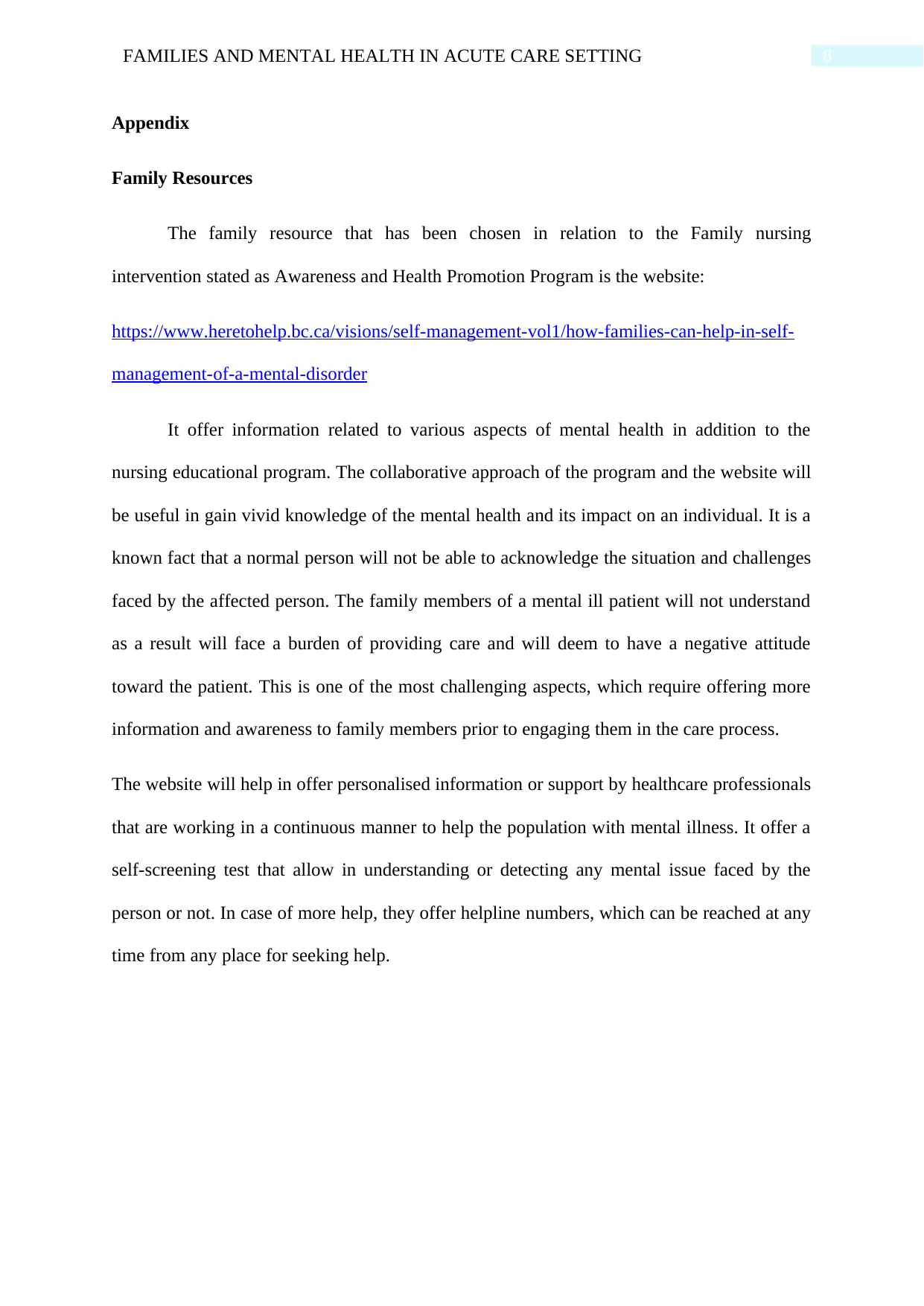
8FAMILIES AND MENTAL HEALTH IN ACUTE CARE SETTING
Appendix
Family Resources
The family resource that has been chosen in relation to the Family nursing
intervention stated as Awareness and Health Promotion Program is the website:
https://www.heretohelp.bc.ca/visions/self-management-vol1/how-families-can-help-in-self-
management-of-a-mental-disorder
It offer information related to various aspects of mental health in addition to the
nursing educational program. The collaborative approach of the program and the website will
be useful in gain vivid knowledge of the mental health and its impact on an individual. It is a
known fact that a normal person will not be able to acknowledge the situation and challenges
faced by the affected person. The family members of a mental ill patient will not understand
as a result will face a burden of providing care and will deem to have a negative attitude
toward the patient. This is one of the most challenging aspects, which require offering more
information and awareness to family members prior to engaging them in the care process.
The website will help in offer personalised information or support by healthcare professionals
that are working in a continuous manner to help the population with mental illness. It offer a
self-screening test that allow in understanding or detecting any mental issue faced by the
person or not. In case of more help, they offer helpline numbers, which can be reached at any
time from any place for seeking help.
Appendix
Family Resources
The family resource that has been chosen in relation to the Family nursing
intervention stated as Awareness and Health Promotion Program is the website:
https://www.heretohelp.bc.ca/visions/self-management-vol1/how-families-can-help-in-self-
management-of-a-mental-disorder
It offer information related to various aspects of mental health in addition to the
nursing educational program. The collaborative approach of the program and the website will
be useful in gain vivid knowledge of the mental health and its impact on an individual. It is a
known fact that a normal person will not be able to acknowledge the situation and challenges
faced by the affected person. The family members of a mental ill patient will not understand
as a result will face a burden of providing care and will deem to have a negative attitude
toward the patient. This is one of the most challenging aspects, which require offering more
information and awareness to family members prior to engaging them in the care process.
The website will help in offer personalised information or support by healthcare professionals
that are working in a continuous manner to help the population with mental illness. It offer a
self-screening test that allow in understanding or detecting any mental issue faced by the
person or not. In case of more help, they offer helpline numbers, which can be reached at any
time from any place for seeking help.
1 out of 8
Related Documents
Your All-in-One AI-Powered Toolkit for Academic Success.
+13062052269
info@desklib.com
Available 24*7 on WhatsApp / Email
![[object Object]](/_next/static/media/star-bottom.7253800d.svg)
Unlock your academic potential
Copyright © 2020–2025 A2Z Services. All Rights Reserved. Developed and managed by ZUCOL.





